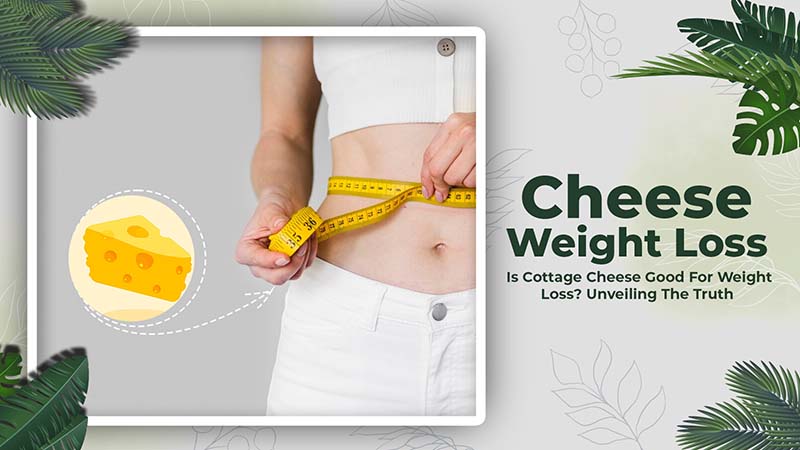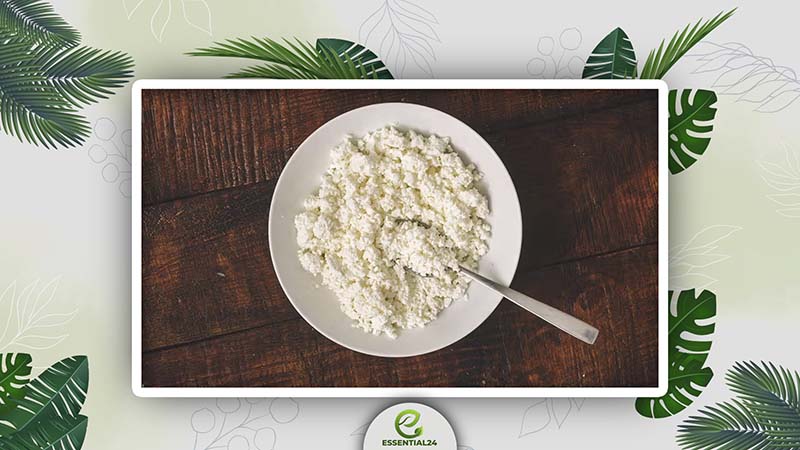Eating only cottage cheese for a few days as part of a weight loss strategy may not harm you immediately, but it could lead to nutrient deficiencies and yo-yo dieting, impacting long-term weight management.
Cottage cheese, known for its tangy flavor, frequently appears in low-calorie diets targeting weight loss and has even evolved into a fad diet of its own. The ‘Is Cottage Cheese Good For Weight Loss?’ question is central to understanding this phenomenon. The cottage cheese diet is a rapid weight loss plan, but it comes with its own set of pros and cons. So let Essential24 learn more deeply in the article below!

1. Basics of a Cottage Cheese Diet
The cottage cheese diet doesn’t have a strict rulebook to follow. It’s basically a meal plan where you stick to eating only cottage cheese for every meal for at least three days. Some folks might add in a few fresh fruits and veggies in small amounts.
But when you’re on this diet, you usually steer clear of alcohol, fruit juices, sodas, and other sugary drinks. It’s all about keeping it simple with the cottage cheese.

2. Benefits of a Cottage Cheese Diet
The cottage cheese diet offers some perks that might appeal to those looking for a straightforward weight loss plan:
- Fast Weight Loss: The main draw of the cottage cheese diet is its potential for rapid weight loss. Any diet that heavily restricts calories typically leads to shedding pounds quickly. However, it’s important to note that much of the initial weight loss may be water weight rather than fat.
- Affordability: Cottage cheese is budget-friendly and widely available. A large tub usually costs just a few dollars at the grocery store, making it an attractive option for those on a tight budget.
- Convenience: This diet is hassle-free. There’s no need for complex recipes or shopping lists. You don’t have to bother with counting calories or points or weighing your food. Plus, cottage cheese is portable and easy to pack, so you can take it with you to work or school without fuss.
- High-Protein Content: Cottage cheese is packed with protein. A single cup of low-fat cottage cheese contains a substantial 28 grams of protein and only 163 calories. High-protein foods digest slowly, keeping you feeling full for longer and reducing the likelihood of overeating. Additionally, protein helps stabilize blood sugar levels and supports muscle building.
3. Drawbacks of a Cottage Cheese Diet
While the cottage cheese diet offers some benefits, it also comes with its fair share of drawbacks:
- Limited Variety: Eating only cottage cheese throughout the day can quickly become monotonous, leading to boredom and potentially causing you to ditch the diet altogether. This lack of variety may trigger binge eating, ultimately sabotaging your weight loss efforts.
- Potential for Cravings: Restrictive diets often trigger cravings for forbidden foods. Research from 2017 suggests that individuals on restricted diets experience more intense food cravings and tend to consume larger quantities of the foods they crave, which can derail weight loss progress.
- Lack of Fiber: Cottage cheese is devoid of fiber, an essential nutrient for digestive health. The recommended daily intake of fiber is 25 grams for women aged 19 to 50, 38 grams for men aged 19 to 50, and slightly less for individuals over 50. A low-fiber diet is associated with issues such as constipation, hemorrhoids, and diverticular disease. Fiber also plays a crucial role in controlling blood sugar levels and lowering cholesterol. Unless there are specific medical reasons for restricting fiber intake, it’s vital to incorporate fiber-rich foods into your diet daily to support overall health.
4. Is a Cottage Cheese Diet Healthy?
While cottage cheese offers some vitamins and minerals, it falls short in providing adequate amounts of others, or lacks them entirely.

If you rely solely on cottage cheese throughout the day, you’ll likely miss out on meeting the Recommended Daily Intake (RDI) of essential nutrients your body needs to function optimally. This can result in decreased energy levels, particularly if you engage in physical activity.
Cottage Cheese and Sodium
One cup of low-fat cottage cheese packs in over 900 milligrams of sodium, which is nearly 40 percent of the RDI. Consuming multiple servings throughout the day can quickly surpass your daily sodium limit.
Excessive sodium intake may lead to various issues, including water retention, bloating, puffiness, and even weight gain. This contradicts the goal of rapid weight loss typically associated with crash diets.
While these side effects may be temporary, repeated adherence to the cottage cheese diet and consistently consuming high levels of sodium can pose more severe health risks, such as:
- High blood pressure
- Increased risk of heart attack and stroke
- Heart failure
- Kidney damage
- Osteoporosis
5. Can Cottage Cheese Help in Weight Loss?

The role of cottage cheese in weight loss is multifaceted and depends on its integration into your overall diet plan. According to Routhenstein, “Cottage cheese can contribute to a healthy weight loss diet when combined with other components of a balanced diet.” Its high-protein, low-carbohydrate makeup can aid in weight loss when accompanied by a calorie deficit and regular exercise.
A mere half-cup of cottage cheese boasts approximately 13 grams of protein. Incorporating protein-rich foods into your meals can promote feelings of fullness, even when reducing calorie intake. As Routhenstein highlights, one of the biggest challenges in weight loss is combating hunger while consuming fewer calories. Research indicates that high-protein foods can effectively increase satiety, particularly in individuals who are overweight or obese.
While this presents a promising starting point, Routhenstein emphasizes the importance of evaluating your entire lifestyle for sustainable weight loss. This includes assessing your overall diet, energy intake, calorie deficit, exercise routine, stress levels, sleep patterns, and other factors. For long-term success in weight management, it’s crucial to adopt a holistic approach that addresses various aspects of health and well-being.
6. Is Cottage Cheese Keto-friendly?
In general, cheese is considered a favorable choice for the keto diet due to its richness in fat, high-quality protein, and calcium. However, the carb and fat contents can vary between different types of cheeses.
Cottage cheese, specifically, contains approximately 84 calories, 2.3 grams of fat, 11 grams of protein, and 4.31 grams of carbohydrates per 100-gram serving. As evident from its carb content, cottage cheese may not be as keto-friendly as some other cheese varieties.
Nevertheless, keto practitioners suggest that you can still incorporate cottage cheese into your keto diet, albeit in moderation. While it may not be as carb-friendly as other options, managing portion sizes can allow you to enjoy cottage cheese while adhering to the principles of the keto diet.
7. Healthy Ways to Savor Cottage Cheese
Incorporating cottage cheese into your diet can help cut calories and fat while promoting healthy weight loss. Here are some delicious ways to savor cottage cheese:
- Blend into Smoothies: Start your day with a nutritious boost by adding cottage cheese to your morning smoothie. Its creamy texture blends well with fruits and vegetables, offering a protein-packed start to your day.
- Top with Fresh Fruits: Elevate the flavor of cottage cheese by topping it with fresh berries, mango, or pineapple for a satisfying and nutritious snack. The combination of creamy cottage cheese with sweet and tangy fruits makes for a delightful treat.
- Use in Salads: Swap out high-fat ingredients like mayo in chicken salad or egg salad with cottage cheese for a healthier alternative. Its creamy texture adds richness to salads while providing a protein boost.
- Spread on Toast: Instead of butter or mayo, spread cottage cheese on toast for a nutritious and satisfying snack or breakfast option. Top with sliced tomatoes, avocado, or cucumber for added flavor and nutrients.
- Incorporate into Recipes: Use cottage cheese as a substitute for ricotta cheese in lasagna or other baked dishes. Its creamy texture adds moisture and richness to recipes while reducing calories and fat.
- Add Fiber-Rich Toppings: Enhance the nutritional value of cottage cheese by sprinkling it with fiber-rich toppings like wheat germ, flax seeds, chia seeds, or hemp seeds. These additions not only add texture and flavor but also provide essential nutrients and promote digestive health.
Incorporating cottage cheese into your meals and snacks in these creative ways can help you enjoy its health benefits while adding variety to your diet.
8. Conclusion
Starting with the question “Is Cottage Cheese Good For Weight Loss?” the answer is a resounding yes. Cottage cheese not only offers a high protein content that aids in satiety and supports muscle health, but it’s also an affordable and versatile choice for those aiming to shed pounds. Including it as part of a varied diet can certainly add zest to your weight loss journey. So, if you’re looking for nutritious tweaks to your eating habits, consider giving cottage cheese a prime spot.
>>See More Related Articles:
1. Is Pilates Good for Weight Loss? Exercises for Weight Loss
2. Is Oatmeal Beneficial for Weight Loss? Benefits of Oatmeal


